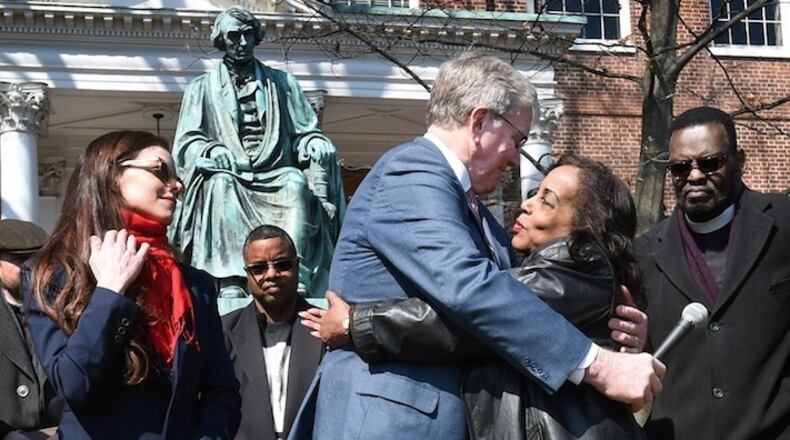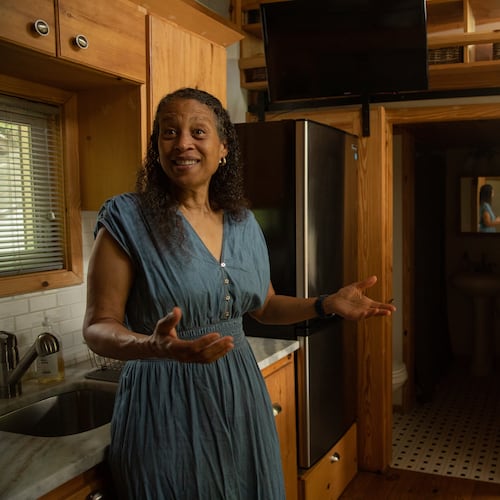Kate Taney Billingsley grew up struggling with her family history.
Her ancestor Roger B. Taney was the U.S. Supreme Court chief justice who wrote the Dred Scott decision, issued March 6, 1857, that ruled Congress could not regulate slavery and that blacks could not be considered U.S. citizens.
She grew up hearing relatives debate a thorny question: Should the family apologize to Scott's descendants for the decision?
"What do you do with that kind of generational guilt?" she asked.
Billingsley, a New York actress and playwright, addressed her angst by writing a play on the matter, and came to Annapolis on Monday — the 160th anniversary of the ruling — to enjoy one of its fruits as her father, Charles Taney of Greenwich, Conn., apologized to Scott's great-great-granddaughter at the foot of a statue of Roger Taney that has stood on the Maryland State House grounds since 1872.
Scott's descendant, Lynne Jackson of St. Louis, accepted the apology, thanked the Taney family for their "courage and grace" in offering it, and gave her forgiveness as cameras clicked and an audience of several dozen applauded on a sunny, windswept day.
"I thank you, and God bless you, and thank all of you for being here," Jackson told the Taney descendants.
Charles Taney, a great-great-great-nephew of the chief justice, said meeting Jackson, working with her over the past year, and studying the Dred Scott case and its aftermath has convinced him an apology for such a far-reaching injustice is only a starting point.
"I'll steal a line from my daughter's play," he said, referring to Billingsley's drama "A Man of His Time," which premiered at The Actors Studio in New York last year. "Apologizing to the Scotts for the Dred Scott decision is like bringing a Band-Aid to an amputation. It's right and necessary to apologize, but what's important now is what actions we can all take" to bring about racial reconciliation in America.
The Taney and Scott descendants also took a stand on an issue currently under consideration in the Maryland General Assembly — a bill that would pack the 83,000-pound bronze sculpture of Taney off to the Maryland State Archives.
The families want the Taney sculpture to remain on the grounds but propose a statue of Scott, an enslaved black who lived in Missouri, be created and installed nearby to suggest an ongoing "dialogue" about matters of racial reconciliation and justice.
"The Scotts and the Taneys believe that Americans should learn from their history, not bury their history," they have said in a joint statement.
They hope to raise money for a permanent educational exhibit on the site that would contextualize the Dred Scott decision and explore its ramifications in American history. If possible, they said they also hope a statue of the Maryland abolitionist Frederick Douglass can be added.
Their position comes as several Maryland communities consider what to do with public art commemorating historic figures from the Confederate side of the Civil War. Two of those debates are taking place in Frederick and Baltimore, towns in which Taney lived and which also boast statues of the Maryland-born jurist.
A commission set up by former Baltimore Mayor Stephanie Rawlings-Blake to consider several of the city's Confederate monuments voted last January to remove a statue of Taney that has stood in the North Garden at Mount Vernon Place since 1887.
Rawlings-Blake appointed the six-member commission as part of a wave of opposition to Confederate symbols in the aftermath of a mass shooting of black worshippers at a Charleston, S.C., church in June 2015.
The panel's vote was not legally binding, and Rawlings-Blake has said the expense of removing the monument precluded immediate action by the city.
House Speaker Michael E. Busch and Senate President Thomas V. Mike Miller sounded less than enthusiastic about the Taney and Scott families' plans. Both have called for statues of abolitionist leaders Harriet Tubman and Douglass to be placed inside the Old House Chamber, a part of the original State House that dates to the 1770s.
Gov. Larry Hogan supports that proposal.
In response to a question about a Dred Scott statue, Miller said: "He's not from Maryland."
Miller said there's money in the state budget for the Douglass and Tubman statues inside the State House, and he supports that plan.
The state Department of Legislative Services has estimated it would cost $77,000 to remove the Annapolis Taney sculpture and another $5,000 per year to store it.
Monday's ceremony was not the first in which Scott and Taney descendants got together to begin what they call the work of reconciliation.
Charles Taney and Jackson first met last May, not long after Billingsley competed her play, a 15-minute scenario in which a fictional descendant of Taney meets a fictional descendant of Scott at a coffee shop on the New Jersey Turnpike.
The Actors Studio, where she is a member, invited her father, a former advertising executive, and Jackson, the founding president of the Dred Scott Heritage Foundation in St. Louis, to participate in a "talk-back" session with the audience after the performance.
The two became friends and began working together, with Taney — now a consultant for nonprofit organizations — offering his time pro bono to help Jackson's group develop a strategic mission.
One of their projects is to raise funds for their proposed Dred Scott statue.
Charles Taney said at Monday's ceremony that any reconciliation is three-part: an apology for injuries, forgiveness from the victims, and the creation of a new foundation of trust.
He was unsparing in describing the injuries caused by his ancestor, noting that even though some have argued that Roger Taney might be forgiven as "a man of his time," he also went far beyond what he saw as his constitutional mandate to consider Scott's action as the Founding Fathers might.
Taney reminded listeners that the judge also called blacks "an inferior race," writing that the only rights they should enjoy are those that whites confer on them.
Jackson accepted the apology moments later. It was the first public formal apology and statement of forgiveness between the families.
The gathering was organized by the Rev. Mike Berry, pastor of Cross Rhythm Church in Annapolis and a descendant of Maryland abolitionists.
Berry said that, as a colony that imported slaves, Maryland owes as powerful an apology to African-Americans as any part of the country, but he hoped Monday's ceremony would resonate across the United States.
"We have an opportunity to speak to the nation," he said. "This is a very historic moment."
About the Author
Keep Reading
The Latest
Featured

